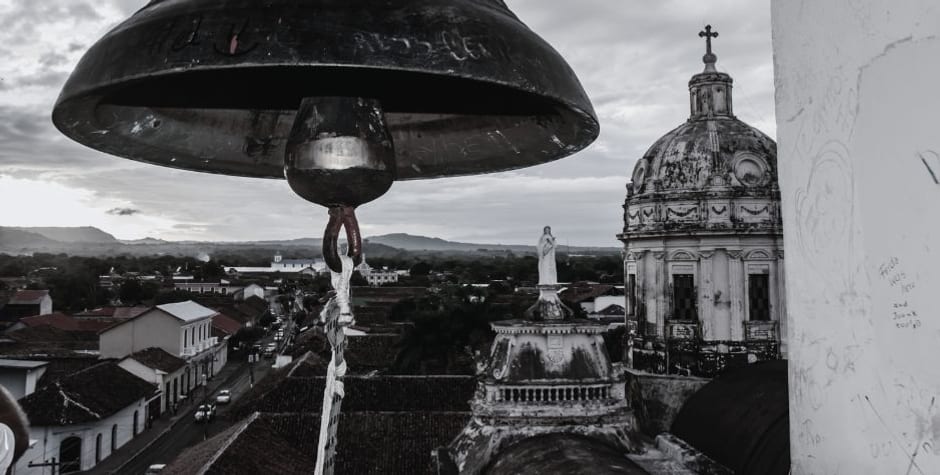

UN: The ECLJ Submits Written Statement on the Persecution of Christians in Nicaragua Under the Ortega Regime
UN: ECLJ Submits Written Statement on the Persecution of Christians in Nicaragua
As the repression against the Catholic Church and Christians intensifies in Nicaragua, the 58th session of the United Nations Human Rights Council is set to adopt the Universal Periodic Review of the human rights situation in Nicaragua. Ahead of this session, the European Centre for Law and Justice (ECLJ) has submitted a written statement. The ECLJ denounces the systematic and targeted persecution of Christians by Daniel Ortega’s regime, which constitutes crimes against humanity.
The state of religious freedom in Nicaragua remains alarming in 2025, with little sign of improvement in the short term. In power since 2007, Daniel Ortega has amended the Nicaraguan Constitution a dozen times to secure an increasingly totalitarian grip on the country. As of January 30, 2025, Ortega and his wife, Rosario Murillo, are officially co-presidents, with no term limits, wielding absolute power. The couple now controls the legislative, judicial, and electoral bodies, as well as regional and municipal administrations
This consolidation of the regime is accompanied by an intensification of persecution against Christians. The year 2025 began with a significant escalation: on January 16, the San Luis Gonzaga Major Seminary, located south of Matagalpa and home to 30 seminarians, was shut down; on January 28, 30 Poor Clares nuns were expelled from their monasteries in Managua and Chinandega. Without significant international intervention or major internal change, the persecution will continue. Perhaps Daniel Ortega will eventually have his own Damascus conversion and change his ways.
Nicaraguan Christians: victims of Daniel Ortega’s authoritarian shift
Originally emerging from the Sandinista Revolution, Ortega’s regime has gradually transformed into a dictatorship, targeting not only political opposition but also the Catholic Church and civil society. Since the violently repressed 2018 protests (which left 325 dead), the Catholic Church has been a prime target. Initially serving as a mediator between protesters and the government, the Church was later accused of conspiracy and acting as a foreign agent. In response, the government escalated its crackdown on the Catholic Church, perceiving it as a threat due to its criticisms of human rights violations.
According to the European Centre for Law and Justice (ECLJ) report published in December 2024, “The Persecution of Christians in Nicaragua (2018–2024, available here)”, more than 870 attacks against the Catholic Church have been documented since 2018. These include arbitrary arrests, physical assaults, the closure of places of worship, and the confiscation of religious property. Over 12,000 Christian processions have been canceled, more than 5,600 associations—most of them Christian—have been dissolved, 22 Christian media outlets have been shut down, and 245 clergy members, including four bishops, have been exiled.
The ECLJ denounces crimes against humanity committed against Nicaraguan Christians at the UN
The systematic and targeted persecution of Christians, the suppression of fundamental freedoms, and the regime’s intent to silence all dissenting voices can be classified as crimes against humanity, according to the United Nations Group of Human Rights Experts on Nicaragua (GHREN) and the Interdisciplinary Group of Independent Experts (GIEI) established by the Inter-American Commission on Human Rights. Leveraging its consultative status with the United Nations, the ECLJ has submitted a written statement to the UN Human Rights Council ahead of its 58th session to denounce the grave human rights violations committed by Daniel Ortega against his people, particularly Christians.
In its statement, the ECLJ highlights the latest cases of Christian persecution. Furthermore, it underscores that Nicaragua has received 16 recommendations explicitly calling for respect for religious freedom, as indicated in the Report of the Working Group on the Universal Periodic Review of Nicaragua (A/HRC/58/17), published on December 24, 2024. This review is set to be adopted in March 2025. While the international community appears to have acknowledged the persecution of Christians in Nicaragua, the ECLJ remains vigilant regarding the country’s response. As the 58th session of the Human Rights Council begins, we urge UN member states to take concrete measures to protect Christians and human rights defenders in Nicaragua.













